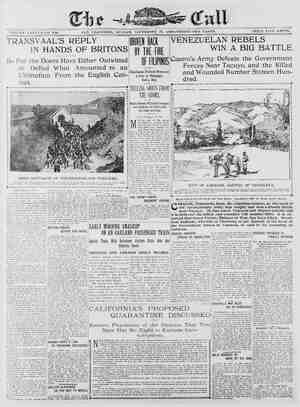The San Francisco Call. Newspaper, September 17, 1899, Page 27
You have reached the hourly page view limit. Unlock higher limit to our entire archive!
Subscribers enjoy higher page view limit, downloads, and exclusive features.
MrS. Leland Stanford, Patroness OfF the Lelznd Stanford Jr. ere than on all SENATOE LELAND STANFORD kable than has sustained. It ford and K share of their w dch || been the permanency with w origin was in a play of politics. wife were beginning to consider the dev fortune to the good of mankind. With that keen insight into the ele- ments of success which was an attribute of both, they decided t the road to achievement lies through the school room, and who would aid man best must equip him by education help himself. Governor Per- kins, aware of this growing intention, appointed Governor Stanford aRe- gent of the State University. It was an appointment in recess of the Legislature and had to be confirmed by the Senate. When that body met the State had changed Governors; Steneman had succeeded Perkins, and there was a swiftly rising tide of enmity to the Southern Pac Railroad. This was generated almost entirely by the Examiner, property of Mr. George Hearst. It so influenced & verror Stone immediately upon his inauguration he withdrew Perkins’ nomination of Governor Stanford to the Regency and sent in another name. This ac- tion for a time suspended the educational intentions of ernor Stan- ford, as far as the public knew. But this suspension was more apparent than real. Governor Stanford was not a man to put millions into a pro- ject for the public benefit without having a voice in the method of its application to its intended purpose. His character ‘was a charming blend of the ideal and practical. His ideals were high and refined. Baut, when he came to apply them to the concrete concerns of life, each must be weighed in the practical scale and be rejected or accepted according to that test. There came to him and his e the great trial which no conditions of fortune or station can avoid or mitigate, in the death of their only son. He was in the flower and promise of his youth, beauti- " by ® d faded, there came to aved parents t determination e, ended so untimely, should be resurrected in the lives of They gathered their great properties and their vast re- sed them in the rich endowment of Leland Stanford niversity. It was a conception that must inspire the most nd and thrill the coldest heart. It was immediately carried into execution. The noble buildings rose from the ground and after the work began it proceeded without let or pause until the faculty was in- stalled and the scholastic duties begun. As was to have been expected in the execution on so great a scals of this noble purpose, the matriculations were counted in hundreds. The first year put this young schocl in the ranks of the oldest and in all higher education it was at once counted as a force that had to bs reckoned with. With that keen judgment which went into all that he did, Gover- Stanford chose for its head Jordan, the pupil of Agassiz, the peer w D. White, and the spirit he brought passed to an able fac- g to see his hopes realized and the memorial to his son as- o oot “m 3 y life were forgotten e State came to mourn by his tomb. mediately illuminated by the high cour- which the work that had absorbed the interests of the Fecd 1 Government, troubles and complications for which no foresight could provide, ame trooping to the assault upon her ngth and courage. But this mother and widow, doubly stricken, e now more fondly cherished. The limit and boundary of bs 1 sa es zre not public knowle , but their magnitude, from w! dged in the The great school went on, consecrated again in the martyrdom its sustenance demanded. A woman once commanded an ¥ ed her country from salien domia n. Women have ruled kingdoms and empires, but above them in history must stand this woman, the trustee of such a sublime trust, and the founder of king- dom upon kingdom in that ineffable domain of the intellect whence issue the principles that govern svery republic, principality and power. When every problem had been solved and. every trouble sur- mounted, the busy waiting stage of the university passed into the busy working stage of further development, and the young school further intrenched its footing and enlarged its influence until its example beat with an awakening light upon the moss-grown walls of its elders in the new world and the old. Mrs. Stanford had completed the high and self-appointed task and had taken her place among the immortals who chose to live among the few to whom it has been given to em- lighten the world.
